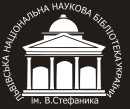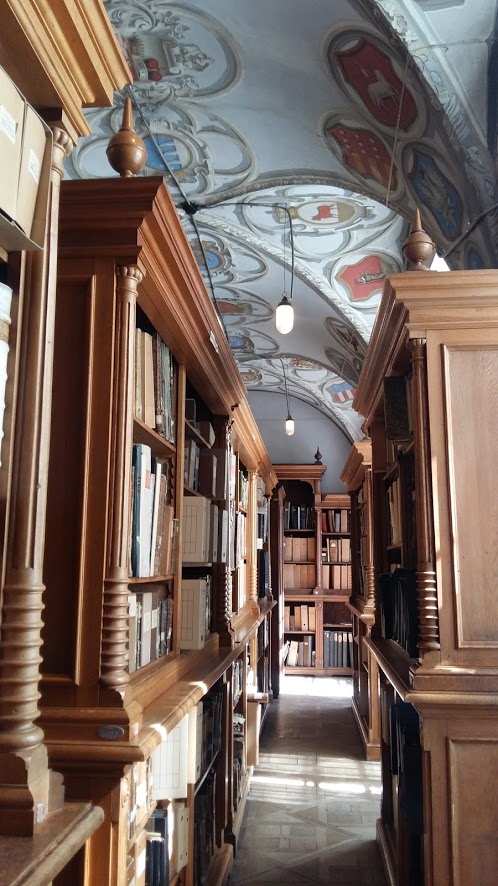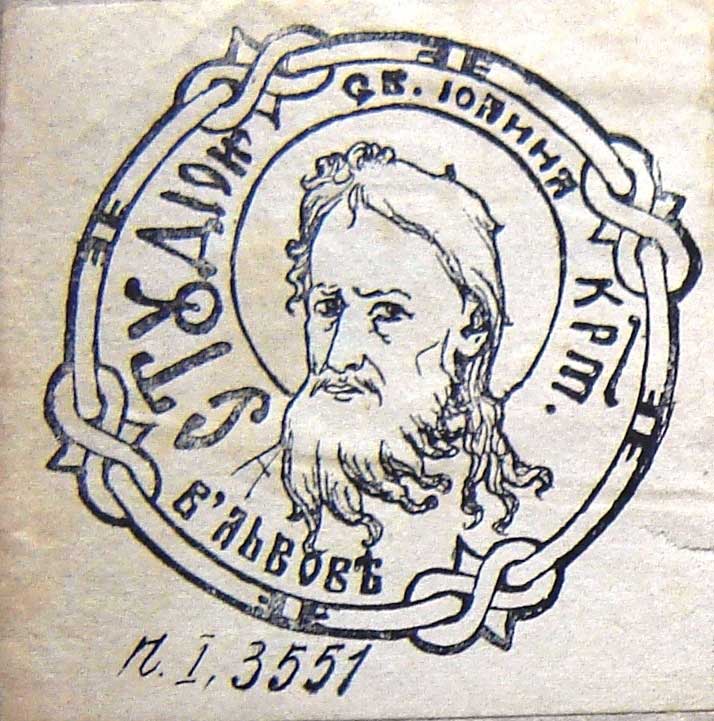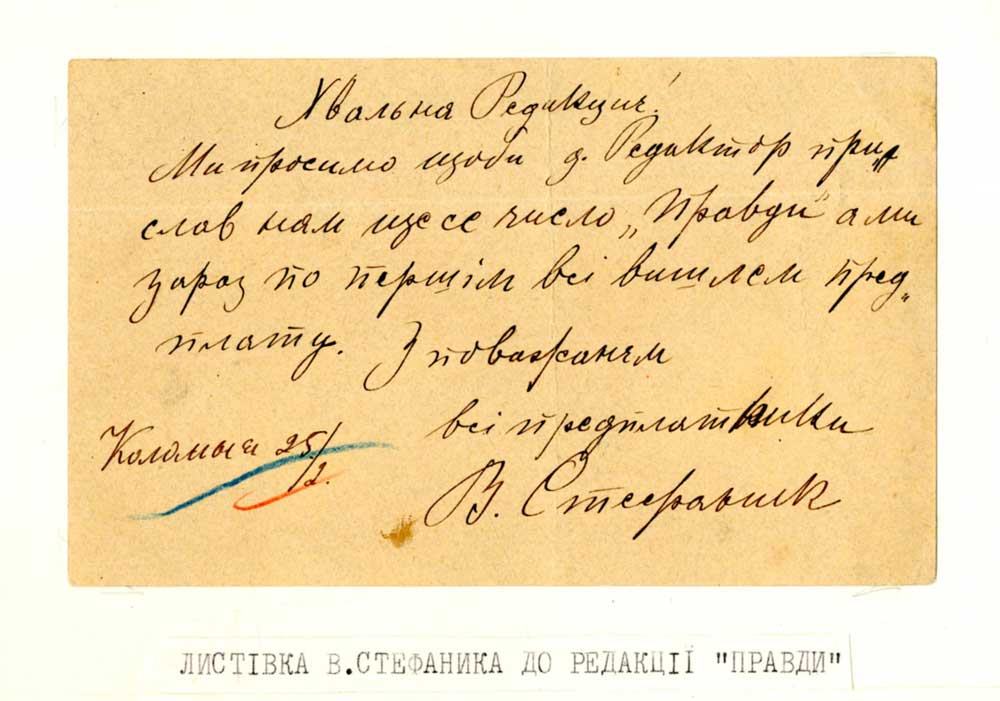Contacts of Manuscript Department:
Stefanyka, str. 2. First and second floor, right-wing.
Tel.: (0322) 236-80-26;
e-mail: [email protected]; head of the Department - [email protected]
Functions of the Department
The Manuscript Department preserves, studies and makes available the manuscript collections of the Vasyl Stefanyk National Scientific Library of Ukraine in Lviv. The Department provides reference service in person or by correspondence. This assistance is generally provided by professional reference librarians in the reading room, but a staff of historians is also available for private consultation with readers.
Department structure
- Scientific division;
- Sector of scientific structuring of manuscript collections and visitor services.
Description of the collections:
The Manuscript Department contains 314 archival collections within134667 volumes. The inventories, indices and catalogues which describe the manuscript collections are a reflection of the diversity and of the centuries-old sedimentation of the collections themselves. Our archival enrichment is still progressing today. The Department poses parchment and paper bases documents, visual and audio documents, digitized volumes. The collections range from hand-written documents of the XI century and later to typewritten documents from the XX century; Languages: Latin, Greek, Ukrainian, Polish, Russian, Czech, Bulgarian, Slovak, Hebrew (Hebrew and Yiddish), Armenian, Arabic, Persian, Turkish, German, French, Italian, and English. The total length of the filled rack shelves is 2756 sq. meters.
The documentary complex of the Manuscript Department of the Library belongs to one of the largest library manuscript collections in the western region of Ukraine. It is a valuable source for those studying the issues of medieval, modern, and contemporary history of Ukraine and neighboring countries. Manuscripts and written original documentary materials, monuments of the history of Western Ukraine, Poland, Austria-Hungary, and other European countries cover the cultural and educational development and socio-political processes that took place in Ukraine during the Old Polish period, Austro-Hungarian rule in Galicia (1772–1918), the period of the Ukrainian People's Republic and the Western Ukrainian People's Republic (1917–1921), interwar Poland (1918–1939), the period of German occupation. The holdings contain a significant documentary array from the Soviet period and Ukrainian independence, documents of emigration institutions, and representatives of the Ukrainian diaspora in America, Canada, England, Germany, and other countries.
The oldest document, "Kormcha" (fragment), dates from the second half of XI century opens one of the largest complexes (over 2000 volumes) of the oldest monuments of Ukrainian literature - manuscripts and their fragments, Latin and Polish codes of worship and medieval chronicles. Most books are decorated with colored miniatures, initials and Renaissance plant ornaments. Along with Slavic and Latin manuscripts, the Jewish, Arabic, Persian, and Turkish cultural monuments have a proper place among the Department's holdings.
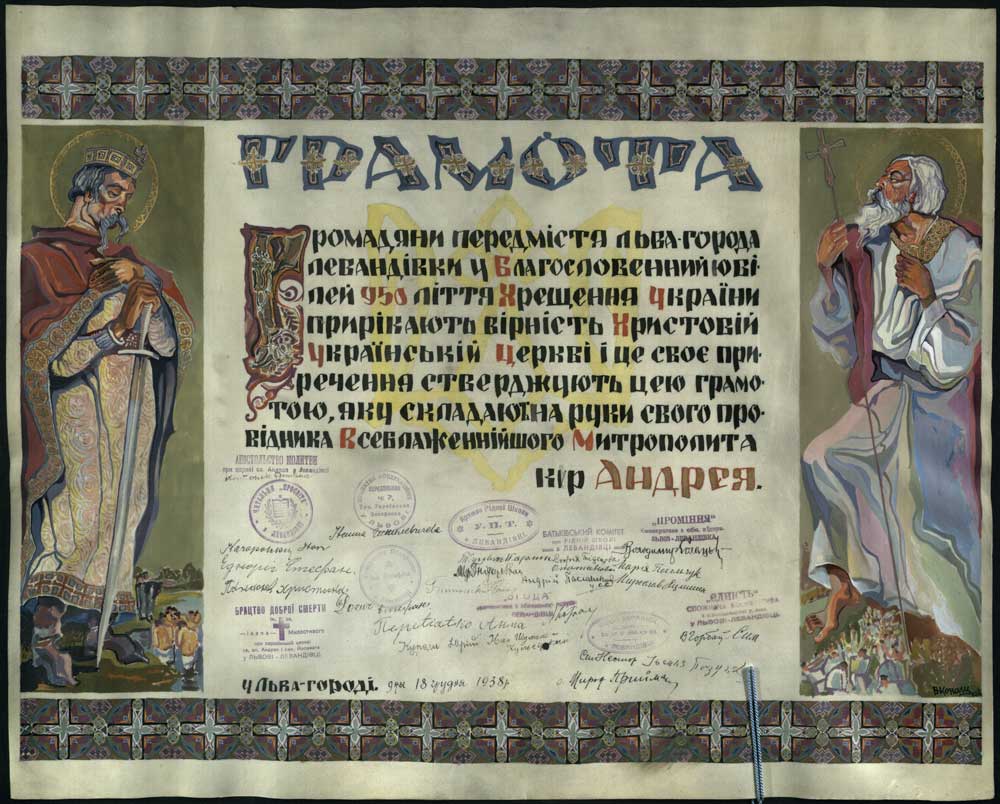
The collections includes acts of legal content - parchment deeds of the XIII-XIX centuries. Unique documents about the historical past of the Ukrainian lands, particularly the history of Lviv, the development of crafts and trade, culture and education, and documents of higher state and religion authorities. A significant part of the collections is diplomas related to the history of Austria, Germany, Russia, Italy, France, Hungary, and the Czech Republic. A substantial part of the diplomas is decorated with miniatures and ornaments that have an artistic value and contain the original seals of rulers, nobility, clergy, cities, and shops. Among these original documents: the diploma of the Grand Duke of Lithuania Svidrigail Olgerdovich in 1451, the deed of gift of King Alexander of Poland in 1505, and many of the - letters related to the history of Austria, Germany, Russia, Italy, France, Hungary, Czech Republic.
Numerous collections of religious institutions enrich East European church history. The history of religion, churches, and monasteries is fully reflected in the Church Slavonic and Ukrainian codices of the Cyrillic alphabet of the XIV-XVII centuries; foreign manuscripts of the XVI-XIX centuries, property and financial documents, record books, inventories, chronicles, and materials of monasteries, including collections of legal acts, statutes, registers of church fraternities, materials of religious societies, and personal documents of their members, metric books, documentary books, papal and episcopal charters, manuscripts of religious publishers.
The Department preserves the documentary heritage of Lviv’s Armenian community of the XVI-XVII centuries; Most of the documents have a cult purposes - servants, collections of rituals, canons, and texts of spiritual songs written in the Grabar language. In particular, a collection of short stories "Gulistan" (list of 1521), a classic of Persian literature of the XIII century. Saadi Shirazky, a tale by Hodja Nasreddin, "History of the Turkish Sultans" by the Moldavian scholar Cantemir.
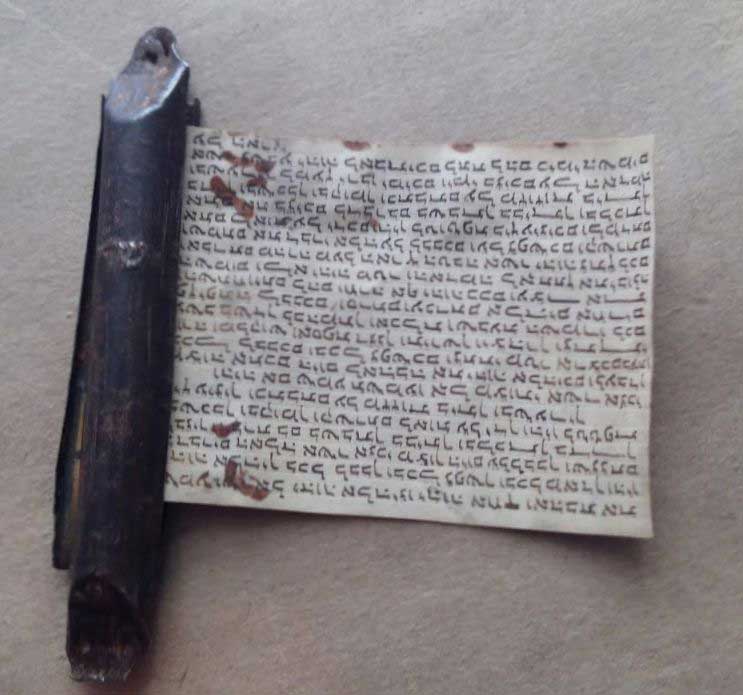
Documentary monuments of Jewish culture chronologically cover the XVII-XX centuries and reflect the Jewish manuscript tradition, and reproduce national characteristics and regional identity. According to the content, the Collection of Jewish manuscripts can be divided into the following groups: philosophical and religious works of various authors; comments on religious books; Torah scrolls; correspondence; historical research; works of fiction by multiple authors (poetic, prose, dramatic, etc.). Most of the repertoire of manuscript codices consists of commentaries on the Mishnah, the Talmud, and Shulkhan Aru. There are also commentaries on the works of famous Jewish philosophers, collections of poetry and plays, and historical and philological (dictionary of homonyms) intelligence. Jewish manuscript codices are marked by "uncharacteristic" design, in particular the lack of miniatures and ornamental decor. One hundred and fifty Torah scrolls of the 18th-19th centuries, made on parchment, have a strictly regulated content, shape and differ only in size and details of the drum handles (brass, wooden), some decorated with ornaments or inlaid with ivory and have authentic covers.
The history of land tenure in Galicia, Volhynia, Podolia, and Bratslav, is represented in family, and estate archives, that are part of separate archival collections and chronologically cover the XV - first half of the ХХ century. Most archives of this type contain inventories of estates, palaces, privileges of ownership, deeds of gift, extracts from act books, tribunals, city and county courts, documents on the sale of real estate, delimitation of estates, parceling of inheritance, property disputes and more.
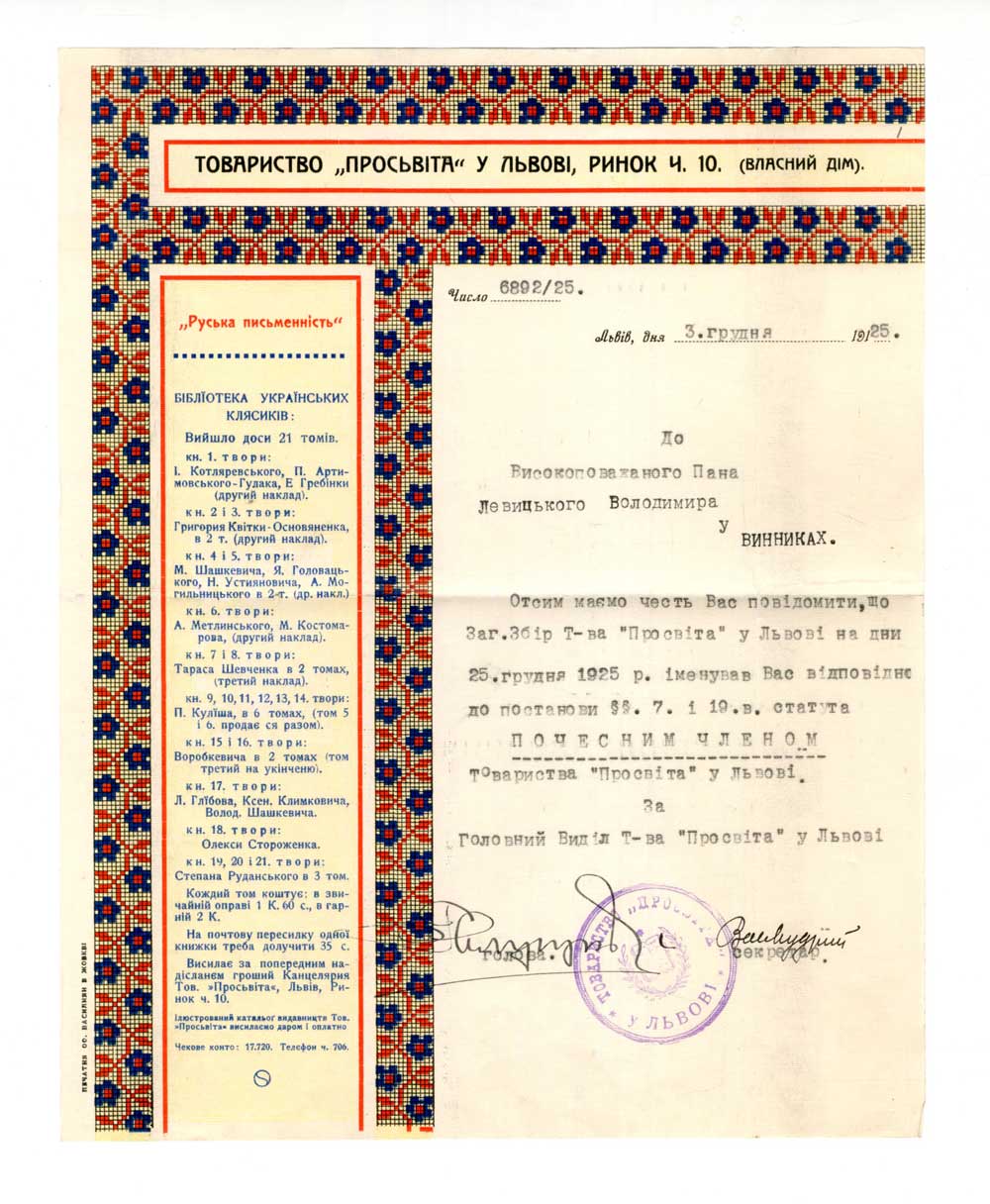
The holdings consist collections of scientific, cultural-educational, other non-governmental organizations (Shevchenko Scientific Society, “Prosvita”, Academic Brotherhood (“Hromada”), Society of Book Lovers, Galician Agricultural Society, etc.), editorial houses of newspapers and magazines (“Vechernytsia”): "Rusalka”, "Pravda", "Hromadskyy Holos", "Literaturno-Naukovyy Biuleten", "Sygnaly", "Gazeta Narodowa", "Wiadomosci historyczno-dydaktyczne", etc.), publishing houses (Ossolinski National Institute in Lviv, "Polish Mother", School Book Publishing House, etc.).
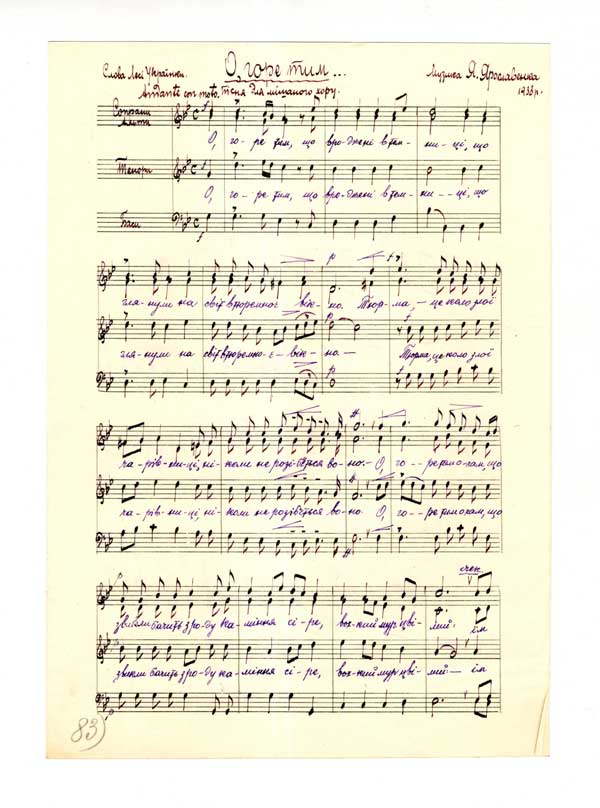
The musical culture of the XIX-XX centuries reflected in the "Collection of musical works and materials on the history of music in the Library of the M. Lysenko Lviv Conservatory (1840–1961)"; archives of composers and musicologists: M. Mentsinsky, R. Savitsky, J. Yaroslavenko, E. Yakubovich, M. Gushalevich, D. Sichinsky. Ancient Ukrainian music of the XVI-XVIII centuries represented by non-linear collections (approximately 500 volumes).
The Department poses papers of prominent Ukrainian scientists, poets. writers, composers (J. Isayevych, R. Ivanychuk, J. Honigsman, R. Lubkivsky, V. Grabovetsky, M. Moroz, R. Kyrchyv, R. Horak, etc.). Significant are the papers of the Ukrainian diaspora representatives: Tetiana and Omelyan Antonovych, Ivanna and Maryana Kotsiv, O. Korchak-Gorodysky, Oleksa and Galyna Gorbach, M. Bogachevska-Khomyak, M. Prokop, M. Demkovych-Dobryansky, "Ukrainian Historical Society" and its members: O. Ogloblyn, L. Vynar, O. Dombrovsky, J. Pasternak, M. Antonovych, and others.
Catalogues of the Department:
The diverse holdings of the Department support scholarly research in many aspects of political, cultural, and scientific history. The Manuscript Department can provide inventory descriptions of the collections; nominal, geographical, and thematic indexes. The inventory catalogues of the Department collections has a reference editions in Ukrainian and foreign languages, includes editions on the history of Ukraine, history of foreign countries, literary studies, linguistics, library and archival theory; Historical disciplines: genealogy, heraldry, sphragistics, paleography etc.
Memorial reading room-museum of Ivan Krypyakevych and Omelyan and Tetyana Antonovych:
It proposes 19 seats for Department users. The museum complex belongs to the innovative initiatives of the Library, which creates a single museum-exhibition cultural space to highlight the main milestones in the life and work of significant figures in the history of Ukraine: Ivan Krypyakevych and Omelyan and Tetiana Antonovych. The memorial part recreates the interior of the office, it exhibits museum objects, cultural values, and historical relics, including, private book-collections of historians, and patrons-founders of the "O. and T. Antonovych Foundation".
User services:
The Department stuff assist researchers with providing access to archival documents, information, reference and bibliographic support (preparation and implementation of scientific inquiries, providing extensive consultations, organizing thematic exhibitions of documents). There is a possibility to work with digitized documents and receive a scan copy of needed archival units.
Research activities:
The Department research work is based on state scientific topic "Archival collections of the Vasyl Stefanyk National Scientific Library of Ukraine in Lviv as a source for studying polytechnic historical and cultural heritage”. The Department stuff reveals the specifics of the formation of the Library collections, movement of historical and cultural heritage and changes in the forms of ownership of historical collections; determining the genealogical affinity archival collections inherited by the Library.
